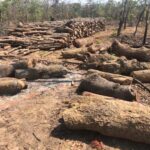The data does not lie, and without serious intervention, the world is rapidly on course to devastating, irreversible climate change…but all is not lost!

Just some of the facts:
Although Climate Change is here, all hope is not lost and we believe that what is needed now is united efforts from the public and private sectors on implementing adaptation plans, that work in parallel to reaching Net-Zero targets.
The IPCC’s sixth assessment report states, ‘’The climate time-bomb is ticking… Our world needs climate action on all fronts – everything, everywhere, and all at once.’” That means reducing fossil fuel use, whilst scaling renewable energy, decarbonizing industry, and protecting and restoring our natural ecosystems. Delivering this requires direct and intrepid action from governments and the private sector.
The biggest challenge now, both for the scientists and policymakers, is much more attention to implementation and closing the gaps between where we need to be, what we promised to do, and what we’re actually doing on the ground. With the world’s economies so inherently linked to the health of the environment, there are vast opportunities for financial investment to support projects designed to restore Earth’s biodiversity.

Carbon finance in particular can be used to help address the twin crises of nature loss and climate change. Natural climate solutions can help states meet their climate change commitments outlined in the 2015 UN Paris Agreement. Carbon credits generated through natural climate solutions offer the opportunity to businesses to compensate for their emissions in a way that would also contribute to halting and possibly reversing the loss of nature. To date, BCP projects have reported an estimated 12,306,172 tCO2e net emission reductions in our project areas since inception. It is, however, critical that corporate use of Natural Climate Solutions as compensation credits always come on top of decarbonization efforts.
REDD+ offers Africa a robust, sustainable, and durable financial model that takes on the issue of climate change on the ground in real-time; it offers communities alternative methods of income that do not encroach on the forests; and, it is a way of addressing the alarming ecosystem decline and biodiversity crisis that we are also facing. It is a means to liberate and empower the Global South in the face of the adverse impacts of climate change.

We address climate change, reduce deforestation, and offer sustainable use of ecosystems – a tool to both mitigate and adapt to climate change.
Find out more about us:
